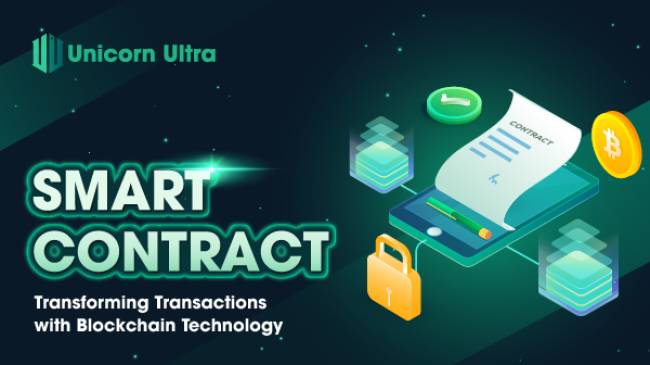Categories: General Information
What is Smart Contract? Transforming Transactions with Blockchain Technology
Explore the world of smart contracts and their potential to revolutionize transactions. Discover what is smart contract, the benefits, inner workings, and diverse applications of this innovative technology.
In the realm of digital transactions, blockchain technology has emerged as a game-changer, offering secure and transparent processes. At the heart of this transformation lies the concept of smart contracts. In this blog, we delve into what is smart contract, the intricacies of smart contracts, exploring their definition, benefits, working mechanisms, and wide-ranging applications. Join us as we unravel the potential of smart contracts to reshape various industries and enhance transactional efficiency.
Table of Contents
What is Smart Contract?
What is smart contract? A smart contract is a self-executing agreement that operates on a blockchain. It represents a digital version of a traditional contract, equipped with predefined rules and conditions. Unlike conventional agreements, smart contracts automatically execute their terms when specific conditions are met, without the need for intermediaries. By leveraging blockchain's decentralized and immutable nature, smart contracts ensure transparency, security, and efficiency in various transactions.

Benefits of Smart Contracts
Transparency: Smart contracts eliminate the need for blind trust by making transaction details accessible to all participants. The decentralized nature of blockchain ensures transparency, reducing the possibility of fraud or manipulation.
Security: Smart contracts employ advanced cryptographic techniques to secure data and ensure the integrity of transactions. With data stored across multiple nodes, it becomes nearly impossible for malicious actors to alter or compromise the contract.
Efficiency and Cost Savings: By automating contract execution, smart contracts eliminate the need for intermediaries, such as lawyers or notaries, reducing associated costs and delays. The streamlined process minimizes human error, improves efficiency, and accelerates transaction speed.
Trust and Reliability: Since smart contracts are executed automatically based on predetermined conditions, the element of trust is embedded within the technology itself. Participants can rely on the code's accuracy, ensuring consistent and impartial contract enforcement.

How do Smart Contracts Work?
Smart contracts are self-executing agreements with the terms of the agreement directly written into code. They run on blockchain platforms, such as Ethereum, and are executed automatically when specific conditions are met. Here's a high-level overview of how smart contracts work:
- Code Creation: A smart contract is written in a programming language supported by the blockchain platform. Solidity is a commonly used language for Ethereum smart contracts. The contract specifies the conditions, rules, and logic that govern the agreement.
- Deployment on the Blockchain: Once the code is written, the smart contract is compiled and deployed onto the blockchain. This process involves broadcasting the contract to the network and having it stored on multiple nodes within the blockchain network.
- Immutable and Transparent: Once deployed, the smart contract is immutable, meaning its code cannot be altered. It remains transparent, visible, and accessible to anyone on the blockchain network. This transparency ensures that the contract's execution and state changes can be verified by all participants.
- Triggering Events: Smart contracts are designed to execute based on predefined events or conditions. These events can be triggered by user interactions, such as sending a transaction or providing specific input data, or external events, such as receiving data from an oracle or meeting a certain time-based condition.
- Automated Execution: When the specified conditions are met, the smart contract automatically executes its predefined actions. These actions can include transferring funds, updating data storage, interacting with other smart contracts, or triggering additional events.
- Data Storage: Smart contracts have their own data storage capabilities called state variables. These variables store and maintain the contract's state, including the values of variables, user balances, or any other relevant data needed for contract execution.
- Gas Fees: Smart contracts are executed on a blockchain network, and each operation requires computational resources. Users must pay gas fees, which are transaction fees paid in the network's native cryptocurrency, to compensate for the computational resources utilized by the contract.
- Security and Auditing: Smart contracts are subject to security vulnerabilities, such as bugs or flaws in the code. Therefore, thorough security audits and testing are essential to identify and mitigate potential risks. Auditing the code helps ensure that the smart contract functions as intended and adheres to best practices.
By utilizing blockchain technology and cryptography, smart contracts provide trust, transparency, and automation in various applications, including financial transactions, supply chain management, decentralized finance (DeFi), and more. They eliminate the need for intermediaries and enable parties to interact directly, execute agreements autonomously, and reduce the risk of fraud or manipulation.

Applications of Smart Contracts
Finance and Banking: Smart contracts can automate financial transactions, such as cross-border payments, remittances, and peer-to-peer lending, reducing costs, increasing speed, and enhancing transparency.
Supply Chain Management: By tracking and verifying each step of the supply chain, smart contracts can ensure transparency, authenticity, and efficiency, reducing counterfeiting and enhancing traceability.
Real Estate: Smart contracts simplify property transactions, automating tasks such as title transfers, escrow services, and rental agreements. This reduces paperwork, minimizes fraud, and expedites the closing process.
Healthcare: Smart contracts can securely manage patient records, facilitate insurance claims, and automate billing processes, ensuring data privacy, reducing administrative burdens, and enhancing patient care.
Intellectual Property: By leveraging smart contracts, creators can protect their intellectual property rights, automate licensing agreements, and ensure fair distribution of royalties.
The future of smart contracts
The future of smart contracts is promising, with ongoing developments and advancements that are likely to shape their evolution. Here are some key aspects to consider regarding the future of smart contracts:
- Expanded Use Cases: Smart contracts are expected to find applications in a wide range of industries beyond finance. Sectors such as supply chain management, healthcare, real estate, voting systems, intellectual property rights, and more can benefit from the automation, transparency, and trust provided by smart contracts. As blockchain technology continues to mature, smart contracts will likely be integrated into various aspects of our digital lives.
- Interoperability: The ability of smart contracts to interact seamlessly across different blockchain networks is an area of active research and development. Efforts are underway to enable cross-chain communication and interoperability protocols, allowing smart contracts from different networks to interact and share data. Interoperability will enhance the versatility and utility of smart contracts, opening up new possibilities for complex decentralized applications.
- Enhanced Scalability: Scalability has been a challenge for blockchain networks, including those supporting smart contracts. Solutions such as layer 2 scaling solutions, sidechains, and sharding are being explored to improve the scalability of smart contracts. These advancements aim to increase transaction throughput, reduce costs, and enhance the overall efficiency of smart contract execution.
- Oracles and External Data Integration: Smart contracts primarily operate within the blockchain environment, relying on internal data. However, incorporating real-world data into smart contracts is crucial for many applications. Oracles, which are trusted sources of external data, are being developed to facilitate the integration of off-chain data into smart contracts. This integration will enable smart contracts to interact with real-time information and respond to real-world events.
- Privacy Enhancements: Privacy is a significant consideration in smart contract development. While blockchain technology offers transparency, there are instances where confidentiality is essential. Techniques such as zero-knowledge proofs, secure multi-party computation, and privacy-preserving smart contracts are being explored to enhance privacy in smart contract execution. These developments aim to strike a balance between transparency and privacy in sensitive applications.
- Smart Contract Templates and Standards: The creation of standardized smart contract templates and libraries can simplify the development process and promote interoperability. Smart contract standards, such as the ERC-20 standard for tokens, have played a significant role in the adoption of blockchain-based assets. Further standardization efforts will enhance the usability, compatibility, and security of smart contracts, making them more accessible to developers and users.
- Regulatory Considerations: As smart contracts gain wider adoption, regulatory frameworks and legal considerations will evolve. Authorities are likely to provide guidance on the legal validity and enforceability of smart contracts. Regulations may address issues such as dispute resolution, identity verification, and consumer protection in smart contract transactions. The integration of smart contracts into existing legal systems will be a topic of ongoing exploration.
The future of smart contracts is dynamic and will be influenced by technological advancements, industry adoption, regulatory developments, and user feedback. As the blockchain ecosystem continues to mature, smart contracts will play a pivotal role in revolutionizing the way agreements are made and executed, driving greater efficiency, transparency, and automation in various sectors.
Conclusion
By discovering what is smart contract, we know that it has the potential to revolutionize the way we transact, offering a secure, transparent, and efficient alternative to traditional agreements. By leveraging the power of blockchain technology, smart contracts provide numerous benefits, including transparency, security, efficiency, and trust. Their applications span across various industries, reshaping finance, supply chain management, real estate, healthcare, and intellectual property. As smart contracts continue to evolve and find widespread adoption, they hold the promise of transforming the global economy, enabling a new era of seamless and trustworthy transactions. Follow https://uniultra.xyz/ for more blockchain updates.
